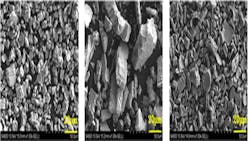Automotive Eco-friendly Material Factory to Open in Georgia
Otsuka Chemical Co., Ltd, based in Osaka, Japan, announced yesterday that they will open a plant in Grifin, Ga. to produce Terracess (fiber-free potassium titanate).
Terracess is a titanate material that has been developed in a flaky (platelet) microparticle form. The material is currently used in applications such as micro-reinforcement and friction.
For the past thirty years, Otsuka Chemical has researched and developed technology for controlling the shape of this titanate material, and the company has produced a wide variety of different shapes and compositions. By employing Terracess, customers can minimize brake squeal and variability in wear among pads, thereby enabling long-term stable brake performance.
The site in Georgia was selected as the company’s third production site for the product, following Japan and China, due to the robust U.S. demand for new automobiles and the presence of numerous brake pad development facilities, the company said.
“I’m thrilled that this state-of-the-art chemical company has chosen Georgia to establish its North American headquarters,” said Georgia Governor Nathan Deal. “We have a longstanding, mutually beneficial relationship with Japan, and our top-ranked business climate will continue to carry global companies such as Otsuka Chemical toward success.”
The factory will support an annual production capacity of 2,000 metric tons, with commercial production targeted for launch in November 2015.
“We look forward to contributing to the local community while working to support our customers across the world through Otsuka Chemical’s environmentally-friendly products,” said Hiroyoshi Tosa, CEO, Otsuka Chemical America, Inc.
Titanate is expected to grow in popularity as an alternative to copper, the company points out due to the fact that recent legislation restricting the use of copper in brake pads has gained traction in the United States.
